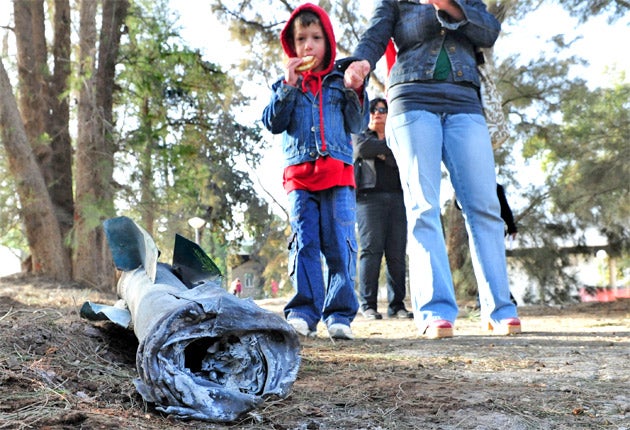Tensions mount on Gaza border after increase in rocket attacks

Israel has appealed to the United Nations to send a strong message condemning an upsurge in rockets fired from Gaza, as tensions increase along its border with the Palestinian enclave.
Meron Reuben, Israel's ambassador to the UN, called on the body to send a "clear and resolute message" that the attacks would not be tolerated after a rocket fell close to a kindergarten in southern Israel earlier this week.
Tensions between Israel and Islamic militants in the Gaza Strip are at their most volatile since Operation Cast Lead two years ago, when Israel launched a 22-day bombardment of the coastal enclave, killing up to 1,400 Palestinians; 13 Israelis died.
Islamic fighters in the blockaded Gaza Strip have ramped up rocket and mortar attacks against Israel in recent days following an Israeli airstrike late last Saturday that killed five suspected militants who were preparing to launch a rocket.
Israel responded with another aerial bombardment, unusually focusing on targets linked to the Islamist group Hamas, which controls the enclave but has largely refrained from firing rockets as part of a de facto ceasefire.
Instead, it is smaller and more radical groups, such as Islamic Jihad, that have claimed responsibility for the recent rocket attacks.
Israel's deputy prime minister Dan Meridor issued a stern reprimand on Army Radio yesterday, saying that Israel would not tolerate continued rocket attacks, and that he hoped Israel would not have to launch a second military offensive.
Israeli security chiefs have speculated in recent weeks that another offensive on Gaza seems inevitable. Many fear Israel could be unwittingly drawn into a conflict, should militants become emboldened.
The country's most senior armed forces official issued a stark warning on Tuesday that the situation along the border could blow up at any moment.
"The situation in the South is tense and fragile, and it could deteriorate if a rocket attack causes a large number of casualties," Lieutenant-General Gabi Ashkenazi, the military's chief of staff, told a parliamentary committee.
An army spokeswoman said that militants have fired 21 mortars and two rockets into Israel since Sunday, and Lt-Gen Ashkenazi disclosed that earlier this month, an Israeli tank had been pierced by a laser-guided Kornet missile, a much more powerful weapon than those previously used.
He called it "one of the most dangerous [missiles] in the battlefield". The disclosure appears to raise the stakes significantly, with Israel saying that it will deploy anti-missile tanks along the border in coming weeks. Up until now, Gaza militants have mostly fired crude projectiles that tend to fall wide of their intended targets.
Meanwhile, analysts argue that neither side wants to be drawn into a repeat of Operation Cast Lead, which left thousands of Palestinians homeless while failing to rout Hamas, which is opposed to Israel's existence. Israel also drew international opprobrium for its use of disproportionate force.
Nevertheless, Israeli observers speculate that Hamas may be caving into pressure to allow militants freer rein at a time when Israel is less able to respond militarily, given US-led pressure to resume the peace process. Hamas insisted, though, that the flare-up in rocket attacks was directly linked to Israeli incursions.
"It is a moral, humanitarian and national obligation to defend our people, land and sacred sites if our Zionist enemy insists on pressing ahead with its aggression," said Fawzi Barhoum, a Hamas spokesman.
Join our commenting forum
Join thought-provoking conversations, follow other Independent readers and see their replies
Comments
Bookmark popover
Removed from bookmarks